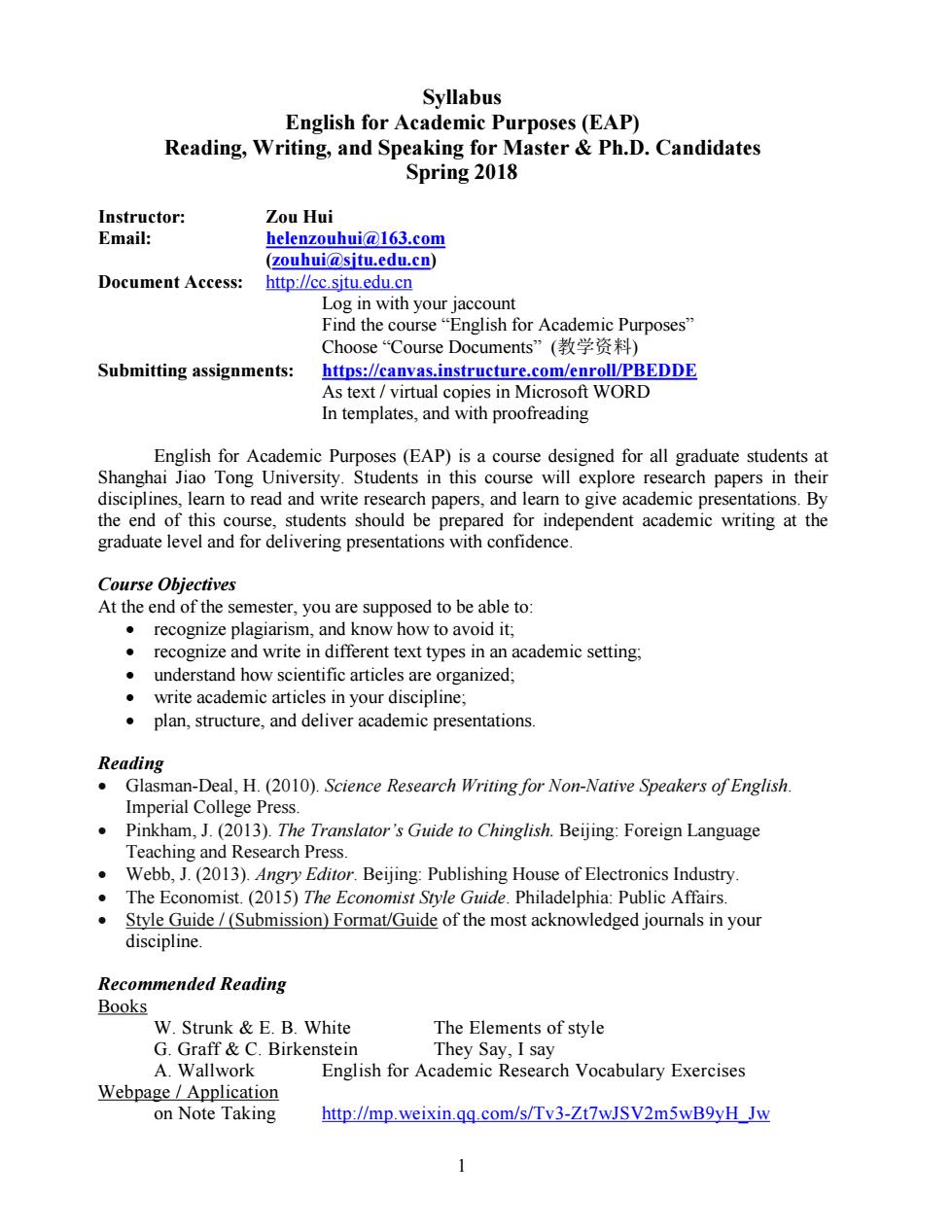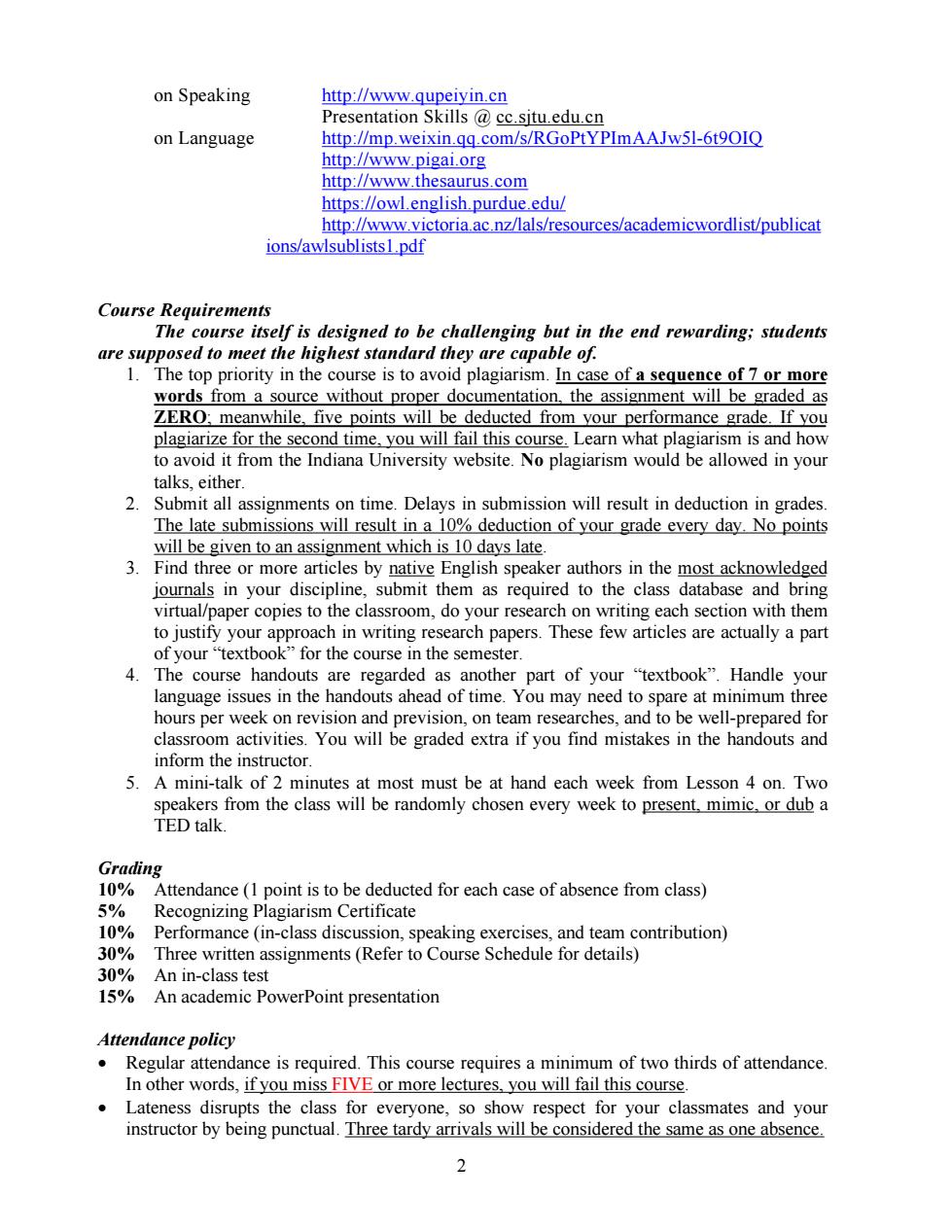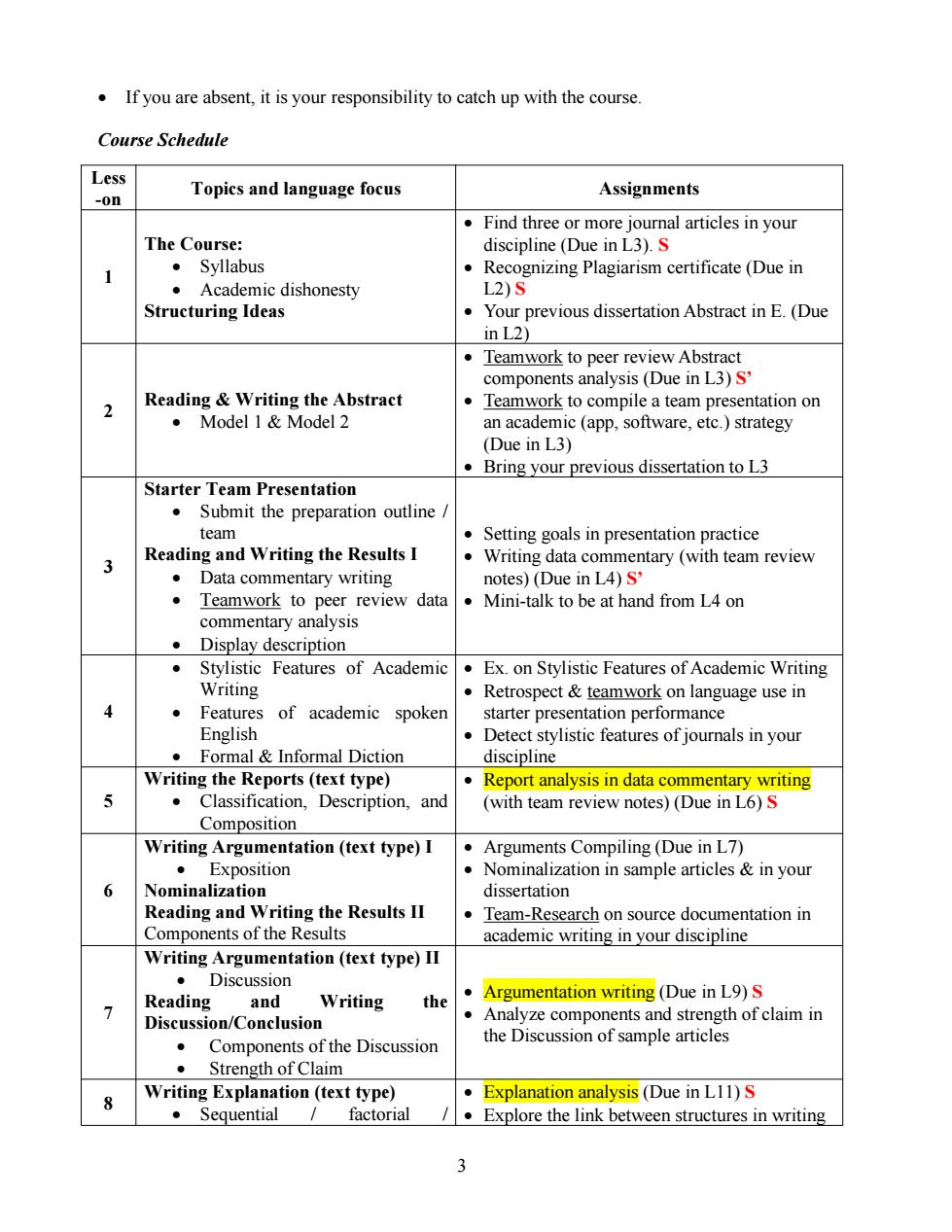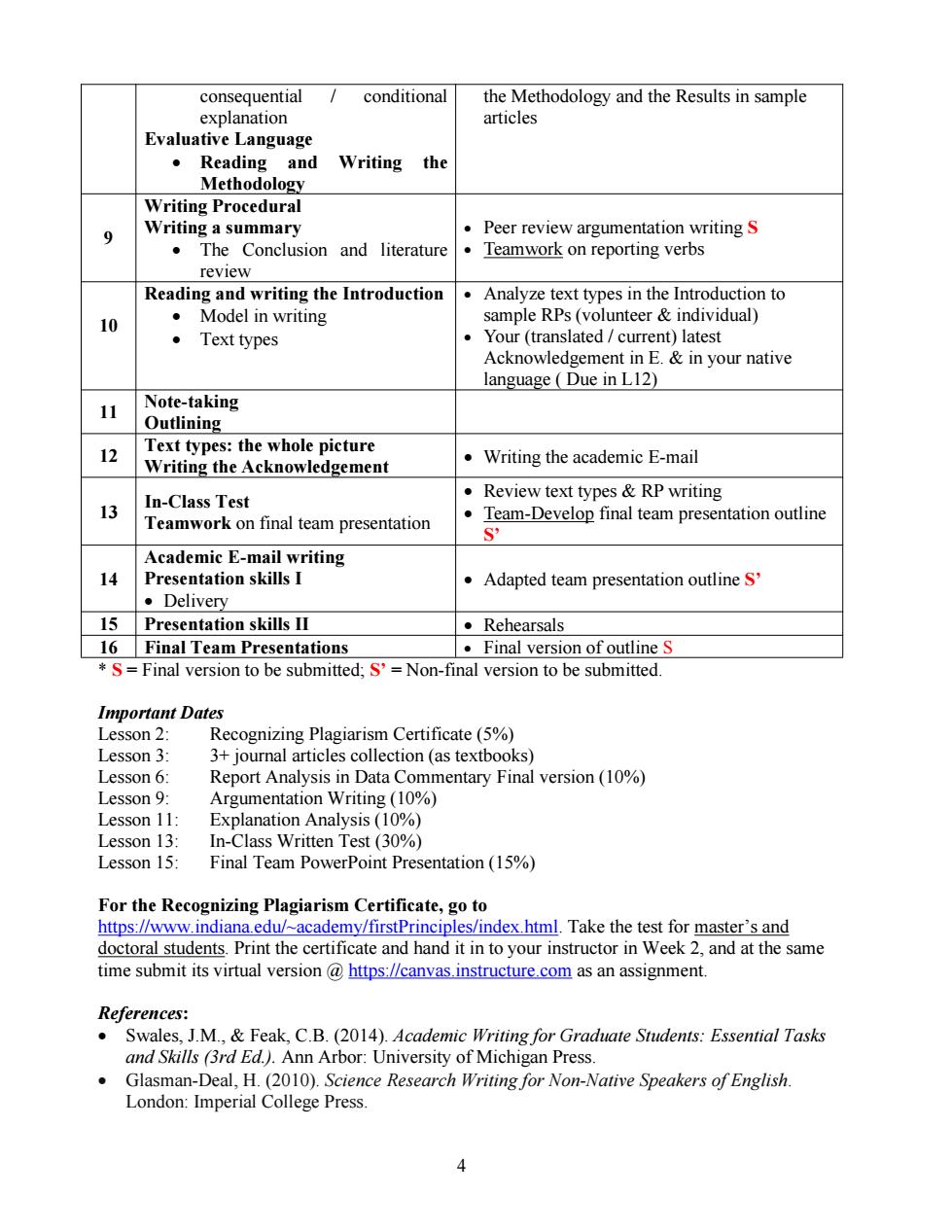
Syllabus English for Academic Purposes(EAP) Reading,Writing,and Speaking for Master Ph.D.Candidates Spring 2018 Instructor: Zou Hui Email: helenzouhui@163.com (zouhui@sjtu.edu.cn) Document Access: http://cc.sjtu.edu.cn Log in with your jaccount Find the course"English for Academic Purposes" Choose“Course Documents'”(教学资料) Submitting assignments: https://canvas.instructure.com/enroll/PBEDDE As text virtual copies in Microsoft WORD In templates,and with proofreading English for Academic Purposes(EAP)is a course designed for all graduate students at Shanghai Jiao Tong University.Students in this course will explore research papers in their disciplines,learn to read and write research papers,and learn to give academic presentations.By the end of this course,students should be prepared for independent academic writing at the graduate level and for delivering presentations with confidence. Course Objectives At the end of the semester,you are supposed to be able to: recognize plagiarism,and know how to avoid it; recognize and write in different text types in an academic setting; understand how scientific articles are organized; write academic articles in your discipline; plan,structure,and deliver academic presentations. Reading Glasman-Deal,H.(2010).Science Research Writing for Non-Native Speakers of English. Imperial College Press. ● Pinkham,J.(2013).The Translator's Guide to Chinglish.Beijing:Foreign Language Teaching and Research Press. Webb,J.(2013).Angry Editor.Beijing:Publishing House of Electronics Industry. The Economist.(2015)The Economist Style Guide.Philadelphia:Public Affairs. Style Guide/(Submission)Format/Guide of the most acknowledged journals in your discipline Recommended Reading Books W.Strunk E.B.White The Elements of style G.Graff C.Birkenstein They Say,I say A.Wallwork English for Academic Research Vocabulary Exercises Webpage Application on Note Taking http://mp.weixin.qq.com/s/Tv3-Zt7wJSV2m5wB9yH Jw 1
1 Syllabus English for Academic Purposes (EAP) Reading, Writing, and Speaking for Master & Ph.D. Candidates Spring 2018 Instructor: Zou Hui Email: helenzouhui@163.com (zouhui@sjtu.edu.cn) Document Access: http://cc.sjtu.edu.cn Log in with your jaccount Find the course “English for Academic Purposes” Choose “Course Documents” (教学资料) Submitting assignments: https://canvas.instructure.com/enroll/PBEDDE As text / virtual copies in Microsoft WORD In templates, and with proofreading English for Academic Purposes (EAP) is a course designed for all graduate students at Shanghai Jiao Tong University. Students in this course will explore research papers in their disciplines, learn to read and write research papers, and learn to give academic presentations. By the end of this course, students should be prepared for independent academic writing at the graduate level and for delivering presentations with confidence. Course Objectives At the end of the semester, you are supposed to be able to: recognize plagiarism, and know how to avoid it; recognize and write in different text types in an academic setting; understand how scientific articles are organized; write academic articles in your discipline; plan, structure, and deliver academic presentations. Reading Glasman-Deal, H. (2010). Science Research Writing for Non-Native Speakers of English. Imperial College Press. Pinkham, J. (2013). The Translator’s Guide to Chinglish. Beijing: Foreign Language Teaching and Research Press. Webb, J. (2013). Angry Editor. Beijing: Publishing House of Electronics Industry. The Economist. (2015) The Economist Style Guide. Philadelphia: Public Affairs. Style Guide / (Submission) Format/Guide of the most acknowledged journals in your discipline. Recommended Reading Books W. Strunk & E. B. White The Elements of style G. Graff & C. Birkenstein They Say, I say A. Wallwork English for Academic Research Vocabulary Exercises Webpage / Application on Note Taking http://mp.weixin.qq.com/s/Tv3-Zt7wJSV2m5wB9yH_Jw

on Speaking http://www.qupeiyin.cn Presentation Skills cc.sjtu.edu.cn on Language http://mp.weixin.qq.com/s/RGoPtYPImAAJw51-6t90IQ http://www.pigai.org http://www.thesaurus.com https://owl.english.purdue.edu/ http://www.victoria.ac.nz/lals/resources/academicwordlist/publicat ions/awlsublists1.pdf Course Requirements The course itself is designed to be challenging but in the end rewarding;students are supposed to meet the highest standard they are capable of. 1. The top priority in the course is to avoid plagiarism.In case of a sequence of 7 or more words from a source without proper documentation,the assignment will be graded as ZERO;meanwhile,five points will be deducted from your performance grade.If you plagiarize for the second time,you will fail this course.Learn what plagiarism is and how to avoid it from the Indiana University website.No plagiarism would be allowed in your talks,either. 2.Submit all assignments on time.Delays in submission will result in deduction in grades. The late submissions will result in a 10%deduction of your grade every day.No points will be given to an assignment which is 10 days late. 3.Find three or more articles by native English speaker authors in the most acknowledged journals in your discipline,submit them as required to the class database and bring virtual/paper copies to the classroom,do your research on writing each section with them to justify your approach in writing research papers.These few articles are actually a part of your"textbook"for the course in the semester. 4.The course handouts are regarded as another part of your "textbook".Handle your language issues in the handouts ahead of time.You may need to spare at minimum three hours per week on revision and prevision,on team researches,and to be well-prepared for classroom activities.You will be graded extra if you find mistakes in the handouts and inform the instructor. 5.A mini-talk of 2 minutes at most must be at hand each week from Lesson 4 on.Two speakers from the class will be randomly chosen every week to present,mimic,or dub a TED talk. Grading 10%Attendance (1 point is to be deducted for each case of absence from class) 5%Recognizing Plagiarism Certificate 10%Performance(in-class discussion,speaking exercises,and team contribution) 30%Three written assignments(Refer to Course Schedule for details) 30%An in-class test 15%An academic PowerPoint presentation Attendance policy Regular attendance is required.This course requires a minimum of two thirds of attendance. In other words,if you miss FIVE or more lectures,you will fail this course. Lateness disrupts the class for everyone,so show respect for your classmates and your instructor by being punctual.Three tardy arrivals will be considered the same as one absence. 2
2 on Speaking http://www.qupeiyin.cn Presentation Skills @ cc.sjtu.edu.cn on Language http://mp.weixin.qq.com/s/RGoPtYPImAAJw5l-6t9OIQ http://www.pigai.org http://www.thesaurus.com https://owl.english.purdue.edu/ http://www.victoria.ac.nz/lals/resources/academicwordlist/publicat ions/awlsublists1.pdf Course Requirements The course itself is designed to be challenging but in the end rewarding; students are supposed to meet the highest standard they are capable of. 1. The top priority in the course is to avoid plagiarism. In case of a sequence of 7 or more words from a source without proper documentation, the assignment will be graded as ZERO; meanwhile, five points will be deducted from your performance grade. If you plagiarize for the second time, you will fail this course. Learn what plagiarism is and how to avoid it from the Indiana University website. No plagiarism would be allowed in your talks, either. 2. Submit all assignments on time. Delays in submission will result in deduction in grades. The late submissions will result in a 10% deduction of your grade every day. No points will be given to an assignment which is 10 days late. 3. Find three or more articles by native English speaker authors in the most acknowledged journals in your discipline, submit them as required to the class database and bring virtual/paper copies to the classroom, do your research on writing each section with them to justify your approach in writing research papers. These few articles are actually a part of your “textbook” for the course in the semester. 4. The course handouts are regarded as another part of your “textbook”. Handle your language issues in the handouts ahead of time. You may need to spare at minimum three hours per week on revision and prevision, on team researches, and to be well-prepared for classroom activities. You will be graded extra if you find mistakes in the handouts and inform the instructor. 5. A mini-talk of 2 minutes at most must be at hand each week from Lesson 4 on. Two speakers from the class will be randomly chosen every week to present, mimic, or dub a TED talk. Grading 10% Attendance (1 point is to be deducted for each case of absence from class) 5% Recognizing Plagiarism Certificate 10% Performance (in-class discussion, speaking exercises, and team contribution) 30% Three written assignments (Refer to Course Schedule for details) 30% An in-class test 15% An academic PowerPoint presentation Attendance policy Regular attendance is required. This course requires a minimum of two thirds of attendance. In other words, if you miss FIVE or more lectures, you will fail this course. Lateness disrupts the class for everyone, so show respect for your classmates and your instructor by being punctual. Three tardy arrivals will be considered the same as one absence

If you are absent,it is your responsibility to catch up with the course. Course Schedule Less Topics and language focus Assignments -0n Find three or more journal articles in your The Course: discipline (Due in L3).S ● 1 Syllabus Recognizing Plagiarism certificate(Due in ·Academic dishonesty L2)S Structuring Ideas Your previous dissertation Abstract in E.(Due in L2) Teamwork to peer review Abstract components analysis (Due in L3)S' 2 Reading Writing the Abstract ● Teamwork to compile a team presentation on ·Model1&Model2 an academic(app,software,etc.)strategy (Due in L3) Bring your previous dissertation to L3 Starter Team Presentation ● Submit the preparation outline team Setting goals in presentation practice Reading and Writing the Results I ● 3 Writing data commentary(with team review Data commentary writing notes)(Due in L4)S' ● Teamwork to peer review data Mini-talk to be at hand from L4 on commentary analysis ·Display description Stylistic Features of Academic Ex.on Stylistic Features of Academic Writing Writing Retrospect teamwork on language use in 4 Features of academic spoken starter presentation performance English ● Detect stylistic features of journals in your Formal Informal Diction discipline Writing the Reports(text type) Report analysis in data commentary writing 5 .Classification,Description,and (with team review notes)(Due in L6)S Composition Writing Argumentation(text type)I .Arguments Compiling(Due in L7) ·Exposition Nominalization in sample articles in your 6 Nominalization dissertation Reading and Writing the Results II ● Team-Research on source documentation in Components of the Results academic writing in your discipline Writing Argumentation(text type)II ·Discussion and Argumentation writing(Due in L9)S 7 Reading Writing the Discussion/Conclusion Analyze components and strength of claim in Components of the Discussion the Discussion of sample articles Strength of Claim Writing Explanation(text type) Explanation analysis(Due in L11)S 8 ● Sequential factorial Explore the link between structures in writing
3 If you are absent, it is your responsibility to catch up with the course. Course Schedule Less -on Topics and language focus Assignments 1 The Course: Syllabus Academic dishonesty Structuring Ideas Find three or more journal articles in your discipline (Due in L3). S Recognizing Plagiarism certificate (Due in L2) S Your previous dissertation Abstract in E. (Due in L2) 2 Reading & Writing the Abstract Model 1 & Model 2 Teamwork to peer review Abstract components analysis (Due in L3) S’ Teamwork to compile a team presentation on an academic (app, software, etc.) strategy (Due in L3) Bring your previous dissertation to L3 3 Starter Team Presentation Submit the preparation outline / team Reading and Writing the Results I Data commentary writing Teamwork to peer review data commentary analysis Display description Setting goals in presentation practice Writing data commentary (with team review notes) (Due in L4) S’ Mini-talk to be at hand from L4 on 4 Stylistic Features of Academic Writing Features of academic spoken English Formal & Informal Diction Ex. on Stylistic Features of Academic Writing Retrospect & teamwork on language use in starter presentation performance Detect stylistic features of journals in your discipline 5 Writing the Reports (text type) Classification, Description, and Composition Report analysis in data commentary writing (with team review notes) (Due in L6) S 6 Writing Argumentation (text type) I Exposition Nominalization Reading and Writing the Results II Components of the Results Arguments Compiling (Due in L7) Nominalization in sample articles & in your dissertation Team-Research on source documentation in academic writing in your discipline 7 Writing Argumentation (text type) II Discussion Reading and Writing the Discussion/Conclusion Components of the Discussion Strength of Claim Argumentation writing (Due in L9) S Analyze components and strength of claim in the Discussion of sample articles 8 Writing Explanation (text type) Sequential / factorial / Explanation analysis (Due in L11) S Explore the link between structures in writing

consequential conditional the Methodology and the Results in sample explanation articles Evaluative Language ·Reading and Writing the Methodology Writing Procedural 9 Writing a summary Peer review argumentation writing S The Conclusion and literature Teamwork on reporting verbs review Reading and writing the Introduction Analyze text types in the Introduction to 10 Model in writing sample RPs(volunteer individual) ·Text types Your(translated /current)latest Acknowledgement in E.in your native language(Due in L12) 11 Note-taking Outlining 12 Text types:the whole picture Writing the Acknowledgement Writing the academic E-mail 13 In-Class Test Review text types RP writing Teamwork on final team presentation Team-Develop final team presentation outline S Academic E-mail writing 14 Presentation skills I Adapted team presentation outline S' 。Delivery 15 Presentation skills II ·Rehearsals 16 Final Team Presentations Final version of outline S S=Final version to be submitted:S'=Non-final version to be submitted. Important Dates Lesson 2: Recognizing Plagiarism Certificate(5%) Lesson 3: 3+journal articles collection (as textbooks) Lesson 6: Report Analysis in Data Commentary Final version(10%) Lesson 9: Argumentation Writing (10%) Lesson 11: Explanation Analysis(10%) Lesson 13: In-Class Written Test(30%) Lesson 15: Final Team PowerPoint Presentation(15%) For the Recognizing Plagiarism Certificate,go to https://www.indiana.edu/~academy/firstPrinciples/index.html.Take the test for master's and doctoral students.Print the certificate and hand it in to your instructor in Week 2,and at the same time submit its virtual version https://canvas.instructure.com as an assignment. References: .Swales,J.M.,Feak,C.B.(2014).Academic Writing for Graduate Students:Essential Tasks and Skills (3rd Ed.).Ann Arbor:University of Michigan Press. Glasman-Deal,H.(2010).Science Research Writing for Non-Native Speakers of English London:Imperial College Press
4 * S = Final version to be submitted; S’ = Non-final version to be submitted. Important Dates Lesson 2: Recognizing Plagiarism Certificate (5%) Lesson 3: 3+ journal articles collection (as textbooks) Lesson 6: Report Analysis in Data Commentary Final version (10%) Lesson 9: Argumentation Writing (10%) Lesson 11: Explanation Analysis (10%) Lesson 13: In-Class Written Test (30%) Lesson 15: Final Team PowerPoint Presentation (15%) For the Recognizing Plagiarism Certificate, go to https://www.indiana.edu/~academy/firstPrinciples/index.html. Take the test for master’s and doctoral students. Print the certificate and hand it in to your instructor in Week 2, and at the same time submit its virtual version @ https://canvas.instructure.com as an assignment. References: Swales, J.M., & Feak, C.B. (2014). Academic Writing for Graduate Students: Essential Tasks and Skills (3rd Ed.). Ann Arbor: University of Michigan Press. Glasman-Deal, H. (2010). Science Research Writing for Non-Native Speakers of English. London: Imperial College Press. consequential / conditional explanation Evaluative Language Reading and Writing the Methodology the Methodology and the Results in sample articles 9 Writing Procedural Writing a summary The Conclusion and literature review Peer review argumentation writing S Teamwork on reporting verbs 10 Reading and writing the Introduction Model in writing Text types Analyze text types in the Introduction to sample RPs (volunteer & individual) Your (translated / current) latest Acknowledgement in E. & in your native language ( Due in L12) 11 Note-taking Outlining 12 Text types: the whole picture Writing the Acknowledgement Writing the academic E-mail 13 In-Class Test Teamwork on final team presentation Review text types & RP writing Team-Develop final team presentation outline S’ 14 Academic E-mail writing Presentation skills I Delivery Adapted team presentation outline S’ 15 Presentation skills II Rehearsals 16 Final Team Presentations Final version of outline S

Rose,D.,and Martin,J.R.(2012).Learning to Write,Reading to Learn:Genre,Knowledge and Pedagogy in the Sydney School.Equinox Publishing Ltd. Martin,J.R.,and Rose,D.(2008).Genre Relation,Mapping Culture.Equinox Publishing Ltd. .O'Hair,D.,Rubenstien,H.,and Stewart,R.(2010).A Pocket Guide to Public Speaking. Boston:Bedford/St.Martin's. Wallwork,A.(2010).English for Presentations at International Conferences.New York: Springer. Wallwork,A.(2011).English for Academic Correspondence and Socializing.New York: Springer. 5
5 Rose, D., and Martin, J. R. (2012). Learning to Write, Reading to Learn: Genre, Knowledge and Pedagogy in the Sydney School. Equinox Publishing Ltd. Martin, J. R., and Rose, D. (2008). Genre Relation, Mapping Culture. Equinox Publishing Ltd. O’Hair, D., Rubenstien, H., and Stewart, R. (2010). A Pocket Guide to Public Speaking. Boston: Bedford/St. Martin’s. Wallwork, A. (2010). English for Presentations at International Conferences. New York: Springer. Wallwork, A. (2011). English for Academic Correspondence and Socializing. New York: Springer